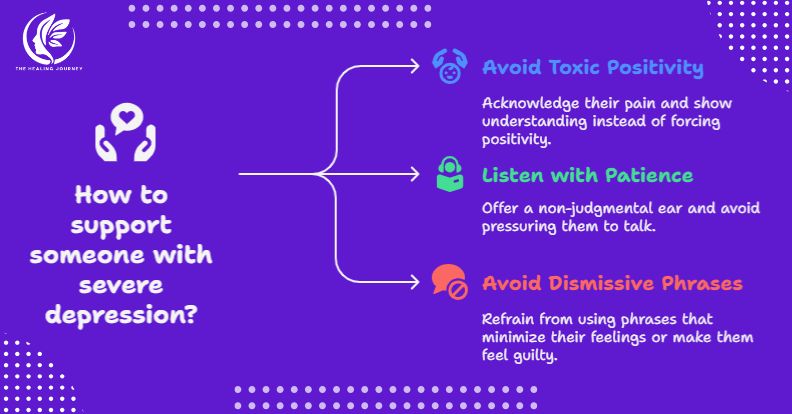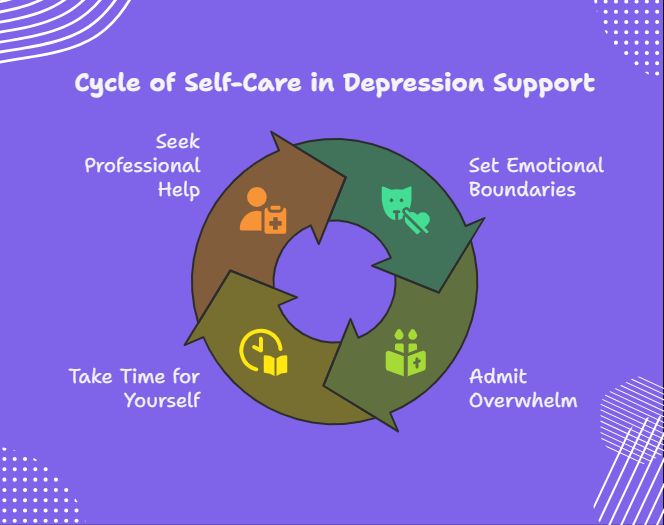How do I help someone with severe depression? Many people ask this when someone they love starts acting in a way that is different from their usual behavior. Maybe your friend has pulled away. Perhaps they seem tired all the time or no longer smile as they used to. You might feel lost, unsure of what to say or do. That’s normal. However, your support can still mean a great deal. Even small things help more than you think. In this blog, you’ll learn how to spot the signs, how to talk to someone with depression, and how to care for yourself, too. Helping someone through this is hard, but you don’t have to do it alone.
Understand What Severe Depression Feels Like
Severe depression is more than feeling sad or tired. It changes how a person thinks, feels, and acts every day. When you support someone with severe depression, it helps to know what they are going through. This way, you can recognize the signs and offer the right kind of support.
Signs of Severe Depression You Can Notice
People with severe depression may seem very withdrawn. They might stop doing things they once enjoyed. Sometimes, they struggle to get out of bed or even eat. Their mood may be consistently low. They may also have feelings of hopelessness or deep sadness that last for weeks.
Why It’s Hard for Them to Ask for Help? Many people hide their struggles because they feel ashamed or worried. They might think others won’t understand or that asking for help makes them weak. Sometimes, they just don’t have the energy to reach out. That’s why it’s essential to monitor changes in their behavior or mood.
How Severe Depression Affects Daily Life
Severe depression can make everyday tasks very hard. Simple things like cleaning the house or answering the phone may feel overwhelming. They might feel tired even after resting. Their mind can feel foggy, making it hard to focus or make decisions. Knowing these challenges helps you be patient and gentle.
Avoid Saying or Doing the Wrong Things
When you want to help someone with severe depression, what you say and do matters a lot. Sometimes, even kind words can hurt if they don’t fit what the person needs. It’s essential to avoid specific phrases and actions that may exacerbate their feelings or lead to misunderstanding.

What Not to Say to Someone with Depression
Avoid telling them to “cheer up” or “just get over it.” These phrases make their feelings seem small or unimportant. Don’t say things like “others have it worse” or “you’re being too sensitive.” These can make them feel guilty or alone. Instead, listen with patience and kindness.
Don’t pressure them to talk if they aren’t ready. Forcing conversations can push them away. Avoid judging their feelings or telling them to “snap out of it.” Also, don’t assume you know exactly what they need. Everyone’s experience with depression is different.
Why Toxic Positivity Can Harm
Trying to stay positive all the time may seem like a helpful approach, but it can also be exhausting. But telling someone to “stay positive” or “look on the bright side” can feel like you’re ignoring their pain. It’s okay to acknowledge that things are hard. Showing real understanding matters more than quick fixes.
Show Up the Right Way
Being there for someone with severe depression takes more than just being present. It means offering steady, real support in a kind and gentle way. Small, thoughtful actions such as checking in, listening without judgment, or simply sitting beside them can help them feel seen and valued. These quiet efforts show that they’re not alone, and that someone truly cares, even when words fail to express it. Your presence can bring comfort and hope.
Listen Without Trying to Fix Everything
Sometimes, people don’t need advice; they just need to feel heard. Instead of jumping in with solutions, take a step back and truly listen. Let them speak without judgment or interruption. Simple phrases like “I’m here for you” or “I’m listening” can offer more comfort than any fix. Your quiet presence can give them space to breathe, feel safe, and know they’re not facing it all alone. That’s real support.
Check In Often, Not Just Once
Depression can last a long time. One kind message or call may not be enough. Keep checking in, even if they don’t always respond. This shows you care and helps them know you won’t give up on them.
It’s important to accept their feelings without judging or minimizing them. Avoid saying things like “It’s not that bad” or “You’ll get over it.” Instead, say “That sounds tough” or “I’m sorry you’re going through this.” This helps them feel safe opening up.
Be Patient and Gentle
Recovery doesn’t follow a straight path. Your loved one will have both good days and tough ones, and that’s completely normal. Even if you don’t fully understand what they’re going through, your patience matters. Small, kind actions can make a big difference. Just showing up and being gentle builds trust over time. Stay steady. You don’t have to fix everything; just being there can bring real comfort and hope.
Gently Encourage Professional Help
Helping someone with severe depression means supporting them to get the right kind of care. Professional help, such as therapy or counseling, can make a significant difference in one’s life. However, it’s essential to convey this in a manner that feels safe and respectful.
Suggest Therapy Without Pressure
Instead of telling them what to do, try suggesting therapy in a kind and open way. You might say, “Talking to someone helped me feel better. Maybe it could help you too.” This keeps the pressure low and shows you care. People with depression often fear judgment, so a calm tone and soft words make a big difference. Let them know the choice is theirs, and you’re here to support them.
Respect Their Feelings if They Say No
Sometimes, people with depression aren’t ready to get help, and that’s okay. If they say no, don’t argue or pressure them. Gently remind them you’ll be there when they’re ready. Being patient builds trust. Pushing too hard can make them feel unsafe or misunderstood. Your calm presence matters more than perfect timing. Support doesn’t mean fixing everything; it means staying close, even when they’re not ready to take the next step.
Offer Help With Small Steps
Getting help can feel overwhelming for someone with severe depression. Even simple steps might seem too much. That’s where you can step in gently. Offer to help find a therapist, book the appointment, or accompany them if they would like support. These small actions may not seem like much, but they matter. They show you care, and they make the process feel less scary. Sometimes, small help creates the biggest change.
Know When to Seek Immediate Help
If you notice signs of a crisis, like talk of self-harm or suicide, take it seriously. Don’t wait or hope it passes. Encourage them to call a crisis line or seek emergency help immediately. Stay calm, speak gently, and remain with them if possible. Acting quickly could save their life. It’s better to step in early than to regret staying silent. Your support can make a real difference.
Protect Your Mental Health, Too
Supporting someone with severe depression can be hard, and it’s normal to feel tired, stressed, or even helpless. These feelings don’t make you weak; they make you human. Taking care of your own mental health is not selfish. It keeps you strong and steady. When you take care of yourself, you’ll be in a better position to offer genuine support. Your well-being matters, too. You can care for them without losing yourself.

Set Emotional Boundaries
It’s okay to say no sometimes. You’re not being selfish, you’re protecting your own mental health. You don’t have to carry all their pain to show you care. Setting clear boundaries helps you stay strong, present, and able to offer real support. When you run low on energy, it becomes harder to help others. Taking care of yourself first isn’t wrong; it’s necessary. You matter too, and your well-being counts just as much.
Admit When You Feel Overwhelmed
If you’re feeling worn out or sad, talk to someone you trust. Sharing your feelings can lighten the load. You might also want to see a counsellor or join a support group. Engage in activities that help you relax and recharge. It could be a walk, reading, or spending time with friends. Taking breaks is not selfish; it’s necessary.
Know When to Ask for Help
If you feel stuck or overwhelmed, don’t wait to get professional advice. Supporting someone with depression can be heavy, and you shouldn’t carry it alone. Talking to a counsellor or mental health expert can help you cope, stay strong, and set healthy boundaries. Getting support doesn’t mean you’re weak; it means you care enough to do it right. You deserve help too and taking care of yourself ultimately benefits everyone.
Share Local Resources in Australia
When someone struggles with severe depression, knowing where to find help can make a real difference. In Australia, trusted services like Lifeline and Beyond Blue offer 24/7 support. You can also find local therapists or mental health clinics in your area. These resources aren’t just for the person struggling; they’re for you too. Getting the right support helps both of you feel less alone, more informed, and better equipped to face the hard days.
Beyond Blue
Beyond Blue offers support, information, and advice for people living with depression and anxiety. Their services are free, private, and user-friendly. Whether you prefer phone, chat, or online tools, help is always within reach. You don’t have to face mental health struggles alone. Beyond Blue makes it easier to take that first step toward feeling better at your own pace, in your own way, with real people who care.
Find a Local Therapist
Sometimes, talking to a professional face-to-face is most helpful. Use services like the Australian Psychological Society’s “Find a Psychologist” tool to locate qualified therapists near you. You can also visit local clinics, such as The Healing Journey, for expert care and guidance.
Other Useful Services
- Headspace (for young people)
- Mental Health Line in your state or territory
- Community health centers
Knowing these options helps you guide your loved one toward the proper support when they’re ready.
Final Thoughts
Helping someone with severe depression is not about fixing them. It’s about being there, offering steady support, and showing you care. Your patience and kindness can give them hope, even on the hardest days. Remember, your presence matters more than perfect words or solutions. Stay with them, keep listening, and take care of yourself too. Together, you can face the challenge step by step.
Frequently Asked Questions
Can I help someone with depression if they refuse therapy?
Yes. Continue to show you care and offer support. Sometimes, people need time before seeking help.
How do I know if it’s severe depression?
Look for long-lasting sadness, loss of interest, changes in sleep or appetite, and withdrawal from activities.
What if I say the wrong thing?
It’s okay. Being patient and listening matter more than saying the perfect thing.
Can people recover from severe depression?
Yes. With the right help and support, many people can improve over time.

One Response